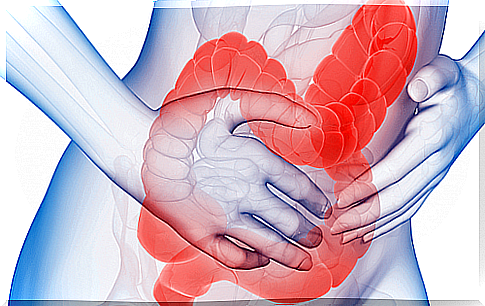The Relationship Between Stress And Irritable Bowel Syndrome

There are more and more clinical studies that tell us about the relationship between stress and irritable bowel syndrome. This gastrointestinal disease affects almost 10% of the population, especially women. Thus, one way to improve the quality of life of these patients would be to provide them with psychological strategies to better manage their emotions.
It is not yet clear exactly how stress can alter our gut health in such a way. However, work like that done at the State University of New York, Albany, points to something extremely revealing. Over 60% who suffer from anxiety disorders suffer from irritable bowel syndrome. Scientists believe that this condition is, in fact, another example of the complex biological interaction between the brain and the gut.
This disease is also the most common digestive problem. So much so that many people go from one specialist to another without finding an effective solution. Therefore, taking into account the psychological factor could allow us to offer an additional therapeutic strategy. This would represent a new perspective which, alongside pharmacology or dietetics, could give a more accurate answer to patients.

Relationship between stress and irritable bowel syndrome
The relationship between stress and irritable bowel syndrome is increasingly recognized within the medical community. However, some believe that psychological factors intensify this digestive disorder but are not the cause. Stress would therefore only abnormally increase the movement and contractions of the gastrointestinal tract.
Other specialists, on the other hand, maintain the theory that our emotional and psychological problems alter our immune system. The natural immunity of our organism would change, to the point of provoking an inflammatory response in the intestinal mucosa. All these organic changes would reveal themselves with very clear symptomatology. The one that defines irritable bowel syndrome. Let’s see what are the most common symptoms of this condition.
- Acute abdominal pain. It varies from moderate to mild and lasts about two hours.
- Alternation between periods of constipation and diarrhea.
- Continuous presence of gas.
- Very rapid feeling of fullness; the patient has hardly eaten when he feels full.
- Nausea, vomiting and a burning sensation in the chest.

What to do to relieve irritable bowel syndrome?
We know that there is a very clear relationship between stress and irritable bowel syndrome. Although we do not have specific studies that tell us whether stress occurs at the onset or only intensifies it, we do know that certain factors are linked to this syndrome. The weight of genetics plays a role in its prevalence. In other words, if our mother is suffering from Irritable Bowel Syndrome and we are female, the likelihood of us suffering from it increases.
We also know that maintaining a balanced diet improves this condition. Therefore, if, in addition to following the medical standards indicated by specialists, we pay attention to our sources of stress, we will gain in quality of life. We cannot forget that irritable bowel syndrome patients suffer from a large number of social limitations and even absenteeism from work. It is a disease that limits the quality of life, a silent pain that undoubtedly deserves greater visibility and sensitivity.

Indications for improving irritable bowel syndrome
We have to start to be aware of one aspect. Our intestines work like a kind of barometer. Anything that preoccupies the brain will have an impact on our intestinal lining. Stress or anxiety are involved in inflammation, in its motility and in its health.
- It is therefore necessary to start to manage your stress a little better. Clarify priorities, remember our needs, give ourselves time, apply adequate breathing and relaxation techniques …
- Another factor that will significantly improve digestive health is exercise. In view of the clear relationship that exists between stress and irritable bowel syndrome, we must take this need for physical exercise into account. Just going for a walk can help.
- Maintain a diet low in FODMAP (simple sugars, dairy products and wheat).
- Reduce the consumption of fats, caffeine and processed foods.
- Stay hydrated.
- Eat quietly, in small amounts and in 5 meals a day.
- Consume prebiotic and probiotic foods.
To conclude, since there are more and more people suffering from irritable bowel syndrome, it is worth taking this information into account. Before resorting to medication, let’s choose to improve our lifestyle. Managing our stress, establishing rest periods, following a healthier diet or practicing relaxation techniques will be of great help to us.









